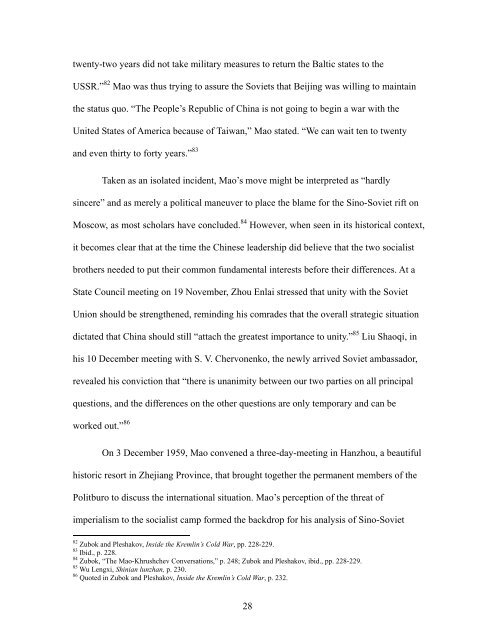The Quarrelling Brothers: New Chinese Archives and a ... - CiteSeerX
The Quarrelling Brothers: New Chinese Archives and a ... - CiteSeerX
The Quarrelling Brothers: New Chinese Archives and a ... - CiteSeerX
- No tags were found...
You also want an ePaper? Increase the reach of your titles
YUMPU automatically turns print PDFs into web optimized ePapers that Google loves.
twenty-two years did not take military measures to return the Baltic states to theUSSR.” 82 Mao was thus trying to assure the Soviets that Beijing was willing to maintainthe status quo. “<strong>The</strong> People’s Republic of China is not going to begin a war with theUnited States of America because of Taiwan,” Mao stated. “We can wait ten to twenty<strong>and</strong> even thirty to forty years.” 83Taken as an isolated incident, Mao’s move might be interpreted as “hardlysincere” <strong>and</strong> as merely a political maneuver to place the blame for the Sino-Soviet rift onMoscow, as most scholars have concluded. 84 However, when seen in its historical context,it becomes clear that at the time the <strong>Chinese</strong> leadership did believe that the two socialistbrothers needed to put their common fundamental interests before their differences. At aState Council meeting on 19 November, Zhou Enlai stressed that unity with the SovietUnion should be strengthened, reminding his comrades that the overall strategic situationdictated that China should still “attach the greatest importance to unity.” 85 Liu Shaoqi, inhis 10 December meeting with S. V. Chervonenko, the newly arrived Soviet ambassador,revealed his conviction that “there is unanimity between our two parties on all principalquestions, <strong>and</strong> the differences on the other questions are only temporary <strong>and</strong> can beworked out.” 86On 3 December 1959, Mao convened a three-day-meeting in Hanzhou, a beautifulhistoric resort in Zhejiang Province, that brought together the permanent members of thePolitburo to discuss the international situation. Mao’s perception of the threat ofimperialism to the socialist camp formed the backdrop for his analysis of Sino-Soviet82 Zubok <strong>and</strong> Pleshakov, Inside the Kremlin’s Cold War, pp. 228-229.83 Ibid., p. 228.84 Zubok, “<strong>The</strong> Mao-Khrushchev Conversations,” p. 248; Zubok <strong>and</strong> Pleshakov, ibid., pp. 228-229.85 Wu Lengxi, Shinian lunzhan, p. 230.86 Quoted in Zubok <strong>and</strong> Pleshakov, Inside the Kremlin’s Cold War, p. 232.28
















